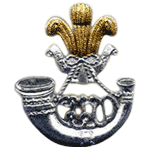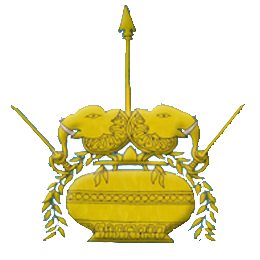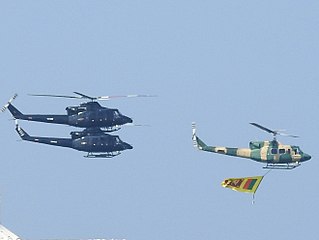
The Sri Lanka Armoured Corps (SLAC) provides the armour capability of the Sri Lanka Army, with vehicles such as the T-55AM2, and type 80/88 main battle tanks; the BMP infantry fighting vehicle; and the BTR-80, and WZ551 armoured personnel carriers. It comprises five regular armoured regiments, a volunteer regiment, and a regimental band. It has an independent Armoured Brigade and is headquartered at Rock House Army Camp, Colombo.
The Corp of Sri Lanka Engineers (SLE) is a combat support arm of the Sri Lanka Army which provides military engineering. It is made up of ten regular regiments and one volunteer regiment. Headquartered at Panagoda Cantonment, it is headed by the Centre Commandant.
The Sri Lanka Signals Corps (SLSC) is a combat support corps of the Sri Lanka Army, responsible for providing military communications, information technology and electronic warfare support. The corps is made up of a signals brigade, ten regular regiments and one volunteer regiment. It is responsible for installing, maintaining and operating all types of telecommunications equipment and information systems. It is headquartered at the Panagoda Cantonment.

The Sri Lanka Light Infantry (SLLI) is the oldest regiment in the Sri Lanka Army and the oldest infantry regiment in the army. It is made up of sixteen regular battalions and nine volunteer battalions, and is headquartered at the Panagoda Cantonment, Panagoda.

The Sri Lanka Sinha Regiment (SLSR) is an infantry regiment of the Sri Lanka Army; it is the second oldest infantry regiment in the army.
Marshal of the Air Force W. D. M. J. Roshan Goonetileke, RWP and bar, VSV, USP is a Sri Lankan senior air force officer. He was a former Governor of the Western Province of Sri Lanka.

The Gajaba Regiment (GR) is an elite infantry regiment of the Sri Lankan Army. Formed on 14 October 1983 at the Saliyapura Camp in Anuradhapura, it is named after the famous Sinhalese King Gajabahu the First. It consists of 14 regular battalions and 6 volunteer battalions.
The National Cadet Corps (NCC) is a youth organisation in Sri Lanka, sponsored by the Ministry of Defence, which operates in schools, and normally includes Army, Navy and Air Force sections. The corp is open for secondary school students on voluntary basis and its officers are government teachers and educational administrators, who serve as instructors. The Cadets are given basic military training in small arms and parades, as well as leadership training.
Air Chief Marshal Jayalath Weerakkody, RWP, VSV, USP is a Sri Lanka air officer who served as commander of the Air Force from 1999 to 2002. He served as Sri Lankan High Commissioner to Pakistan.

Security Forces Headquarters – Wanni is a regional command of the Sri Lanka Army, that is responsible for the operational deployment and command all army units stationed in and around the southern part or the Vanni region of the Northern Province, this includes several divisions and the independent brigades. Currently due to ongoing combat operations it is the largest command in the country. It is one of the five Security Forces Headquarters and the General Officer Commanding it is one of the most senior officers in the army, the post is designated as Commander Security Forces Headquarters - Vanni. The current Commander SFHQ-W is Major General Hemantha Bandara. The SFHQ-W is based at the defense complex at Vavuniya.

No. 4 (VVIP/VIP) Helicopter Squadron is a squadron of the Sri Lanka Air Force. It currently operates Bell 412/412EP/212/206JR from SLAF Ratmalana for VVIP/VIP Air transport.
Military Secretary is a senior position in the General Staff of the Sri Lanka Army, the post is held by a senior officer of the Major General rank. The Military Secretary's Branch is responsible for handling all matters pertaining to officers such as promotions, postings and discipline of the Sri Lanka Army. The current Military Secretary is Major General S.W.M Fernando WWV RWP RSP VSV USP ndc psc. He assumed office on December 21, 2022.
Major General M.C. Mendaka. P. Samarasinghe, RWP, RSP, USP, ndc, psc, SLE was a Sri Lankan general, he was a former Chief of Staff, Sri Lanka Army and also the former Commander Security Forces Headquarters - Jaffna; he was also the General Officer Commanding, 22 Division.

Air Chief Marshal Kolitha Gunathilake, RWP, RSP, VSV, USP, ndc, psc, qfi is a Sri Lankan fighter pilot and a former Chief of Defence Staff and Commander of the Sri Lankan Air Force.
Major General (Retd) Janaka Walgama RSP, VSV, USP, ndu, psc was the Military Adviser to the Sri Lanka's Permanent Representation to the United Nations at New York.
Major General K.A.D. Amal Karunasekara, RWP, RSP, VSV, USP, ndu, psc is a retired senior Sri Lankan army officer who served as 51st Chief of Staff of the Sri Lanka Army. Major General (Rtd) Karunasekara is also the first Commandant of the National Defence College, Sri Lanka.
Air Chief Marshal Oliver Matthew Ranasinghe, RWP, VSV, USP, ndc, psc was the 9th Commander of the Sri Lankan Air Force.
Security Forces Headquarters – Central (SFHQ-C) is a regional command of the Sri Lanka Army, that is responsible for the operational deployment and command all army units stationed in the Central and Southern parts of the island, this includes two divisions. The current Commander SFHQ-C is Major General M K S Silva RWP RSP ndu. The SFHQ-C is based at the Diyatalawa Garrison.
Commandant Sri Lanka Army Volunteer Force (SLAVF) has been the title of the head of the Sri Lanka Army Volunteer Force. The post is held by a regular officer of the rank of major general and is the fourth senior position in the army. Commandant is in charge of the Volunteer Force Headquarters and is assisted by a deputy commandant.
Mohammed Jubayer Salehin SUP, ndu, psc is a major general of the Bangladesh Army. Currently attached in Ministry of Foreign Affairs. Beforehand he served as Director General of Bangladesh Institute of International and Strategic Studies. He was adjutant general at army headquarters. Prior to join AG, he was Engineer-in-Chief at the Bangladesh Army. Earlier, he served as commandant of Defence Services Command and Staff College (DSCSC) since 24 January 2021.






